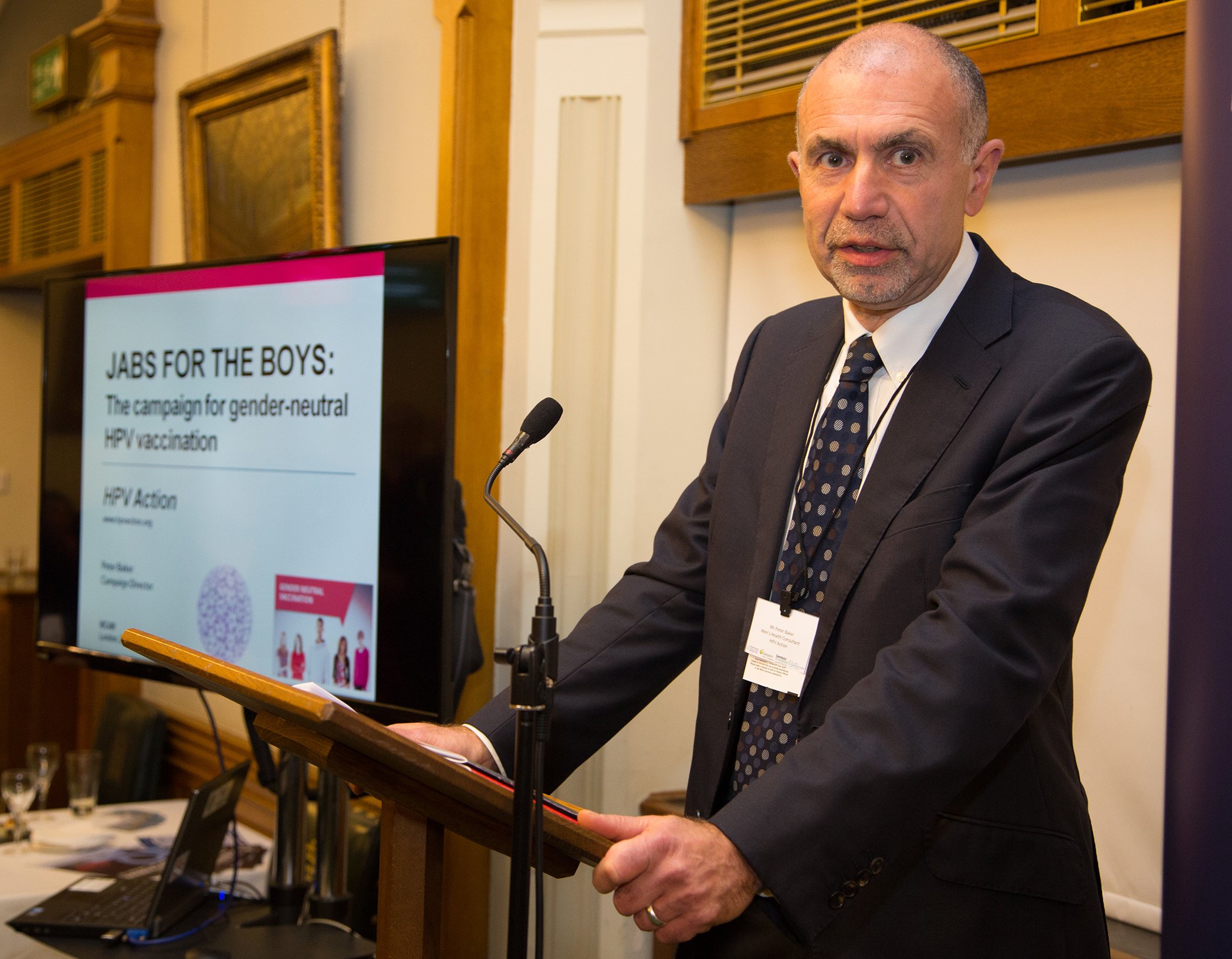In 2012, men’s health advocate Peter Baker came across an article in a scientific journal that made him pause. It argued that human papillomavirus (HPV) was not just a women’s issue, and that the health community was failing boys by not vaccinating them against it.
HPV, the most common sexually transmitted infection, is contracted through sexual and skin-to-skin contact. The virus, which can be prevented by vaccine, impacts all genders and mostly causes genital warts. However, it is also responsible for causing 5% of all cancers worldwide. Depending on the vaccine administered, it can protect against cancer-causing strains of the virus and strains of the virus which cause the majority of genital warts.
While HPV is the main cause of cervical cancer, it also causes head and neck cancers, anal cancer, and penile cancer.
In 2008, girls in the UK ages 12 and up began receiving the HPV vaccination. While more than 80% of girls and women ages 15 to 24 are vaccinated against HPV, studies say this does not adequately protect males. In addition, men who have sex with men are not protected at all.
“When I read that it made so much sense to me,” Baker said.
He clipped the article, reached out to the author — British virologist Margaret Stanley — and began researching the subject further.
As Baker, who has worked in men’s health for 25 years, continued to learn more, he reached out to peers Tristan Almada, founder of the HPV and Anal Cancer Foundation and Jamie Rae, founder of the Throat Cancer Foundation.
“We realized that there was a major gap in the UK vaccination program and we needed to put boys on the agenda,” he said. “We basically realised we could do something about this. That was a tremendously exciting moment.”
The trio reached out to a range of organizations to share evidence in favour of gender-neutral vaccination. They found diverse allies from cancer organizations to queer men’s groups to teachers’ unions. With more than 50 organizations wanting to collaborate to push for a gender-neutral vaccine program, Baker founded HPV Action in 2013 and became its campaign director.
 In 2012, Peter Baker came across an article in a scientific journal that made him pause. It argued that human papillomavirus (HPV) was not just a women’s issue, and that the health community was failing boys by not vaccinating them against it.
In 2012, Peter Baker came across an article in a scientific journal that made him pause. It argued that human papillomavirus (HPV) was not just a women’s issue, and that the health community was failing boys by not vaccinating them against it.
In 2012, Peter Baker came across an article in a scientific journal that made him pause. It argued that human papillomavirus (HPV) was not just a women’s issue, and that the health community was failing boys by not vaccinating them against it.
“We had a single objective. We stayed very focused on that and there was complete agreement [of the mission],” Baker said.
Their mission: to convince the Joint Committee on Vaccination and Immunisation (JCVI), a UK government vaccination advisory group, of the importance of gender-neutral HPV vaccination.
With that vision, HPV Action, self-funded by member organizations to the tune of £75,000, managed to stretch out their budget to what would become a five-year national campaign.
The group focused on three pillars: influencing scientific and medical opinion, engaging politicians, and campaigning in the media.
HPV Action estimated that HPV vaccination for boys would prevent about 2,000 cancer cases and more than 40,000 cases of genital warts for men every year at a price of £20 million a year, Baker said.
In the UK, articles about gender-neutral HPV vaccination made headlines and politicians across all parties began vocalising their support of vaccinating boys against the virus.
Despite a promising public campaign, four years passed before JCVI issued their interim decision. The committee announced it would not recommend gender-neutral vaccination in 2017.
According to Baker, the JCVI is “not interested in issues of equity and equality — their prime concern and purpose by the government is to look at cost effectiveness.”
With that, members of HPV Action felt they had few options left. One of their founding members, Rae, hired a lawyer and threatened to take legal action against the government for discrimination on the basis of sex.
Despite being ready to take the case to court, Rae didn't need to in the end. In 2018, the JCVI reversed its decision. The advisory group would, in fact, recommend that boys be vaccinated against HPV, believing that ultimately, it would be the most cost-effective option from a preventative perspective.
“[The JCVI was] under a lot of political, media, and legal pressure to change their minds — and all of that happened because of our campaign. Our strong suspicion is that they wanted to avoid going to court, but they’ll never admit that,” Baker said.
As of September 2019, boys ages 12 and up began receiving the optional HPV vaccine in schools. While the vaccination rollout has been interrupted by school closures due to COVID-19, Baker is hopeful the backlog will be cleared.
He is also hopeful that more countries will follow suit.
Currently, the health activist is working with the HPV Action Network in Europe to achieve gender-neutral vaccination throughout European countries.
“For many of us, cancer can be prevented simply by sticking a needle in someone’s arm. It must be the easiest way to prevent cancer,” Baker said. “We [have] an opportunity to do something simple, relatively cheaply, that would save an awful lot of lives, and prevent an awful lot of suffering.”
If 2020 has taught us anything about global health, it’s the importance of vaccines. The World's Best Shot is a profile series dedicated to sharing the stories of vaccine activists around the world.
Disclosure: This series was made possible with funding from the Bill and Melinda Gates Foundation. Each piece was produced with full editorial independence.